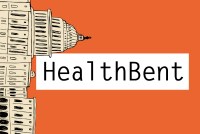Latest Morning Briefing Stories
Pain Clinics Made Millions From ‘Unnecessary’ Injections Into ‘Human Pin Cushions’
Pain MD, which once ran as many as 20 clinics across three states, gave chronic-pain patients about 700,000 total injections near their spines, according to court documents. Last year, federal prosecutors proved at trial that the shots were medically unnecessary and part of an extensive fraud scheme.
Iowa Medicaid Sends $4M Bills to Two Families Grieving Deaths of Loved Ones With Disabilities
States are required to claw back health care costs from the estates of many Medicaid recipients. Some, including Iowa, are particularly aggressive in their pursuit.
Urgent CDC Data and Analyses on Influenza and Bird Flu Go Missing as Outbreaks Escalate
Delays in urgent CDC analyses of seasonal flu and bird flu, and the agency’s silence, will harm Americans as outbreaks escalate, doctors and public health experts warn.
As States Mull Medicaid Work Requirements, Two With Experience Scale Back
As Republicans consider adding work requirements to Medicaid, Georgia and Arkansas — two states with experience running such programs — want to scale back the key parts supporters have argued encourage employment and personal responsibility.
A Dose of Love: The Winning Health Policy Valentines
KFF Health News shares our favorite reader-submitted health policy valentines. One struck us in the heart and inspired an original cartoon.
Top California Democrats Clash Over How To Rein In Drug Industry Middlemen
Frustrated by spiraling drug costs, California lawmakers want to increase oversight of pharmaceutical industry intermediaries known as pharmacy benefit managers. It’s unclear whether they can persuade Gov. Gavin Newsom to get on board.
Montana Looks To Regulate Prior Authorization as Patients, Providers Decry Obstacles to Care
Patients and providers say health insurers’ preapproval requirements lead to delays and denials of needed medical treatments. Insurers argue that prior authorization keeps costs down.
Se busca médico: estrategias de un pueblito de Florida para atraer a un doctor generalista
Se espera que la escasez de médicos en Florida aumente en la próxima década, y un estudio prevé una necesidad de 18.000 médicos en todo el estado.
Kaiser Permanente Back in the Hot Seat Over Mental Health Care, but It’s Not Only a KP Issue
Mental health workers on strike in Southern California say Kaiser Permanente is woefully understaffed, its therapists are burned out, and patients are often denied timely access to care. The insurer says it has largely fixed the problem. But across California and the nation, mental health parity is still not a reality.
Blood Transfusions at the Scene Save Lives. But Ambulances Are Rarely Equipped To Do Them.
More than 60,000 people bleed to death every year in the United States. Many of those deaths occur before the patient reaches a trauma center where blood transfusions can be given.
Wash, Dry, Enroll: Finding Medicaid Help at the Laundromat
State Medicaid and Affordable Care Act programs have long struggled to connect with lower-income Americans to help them access care. Now some are trying an alternative approach: meeting them at the laundromat.
Trump’s Already Gone Back on His Promise To Leave Abortion to States
On the campaign trail, President Donald Trump said the power to make abortion policies “has been returned to the states.” In his first two weeks in office, he’s already gone further to restrict abortion than any president who’s held office since the 1973 “Roe v. Wade” decision, writes Julie Rovner.
For California Farmworkers, Telehealth Visits With Mexican Doctors Fill a Gap
The MiSalud app enables Spanish-speaking users in the U.S. to meet virtually with health professionals in Mexico via a smartphone app. At Taylor Farms in Salinas, California, the novel program has been a hit.
Este método, que podría llegar a tener gran utilidad en la era de los teléfonos inteligentes, es una aplicación que permite efectuar consultas médicas transfronterizas.
Across the South, Rural Health Care Has Become ‘Trendy.’ Medicaid Expansion Has Not.
State legislatures nationwide, including several in the South, are spending millions to improve rural health outcomes and access. For years, though, most Southern states have refused billions of federal dollars to provide public health insurance to more low-income adults. That isn’t likely to change with Trump back in office.
At His HHS Job Interview, RFK Jr. Stumbles Over Health Policy Basics
Robert F. Kennedy Jr., the anti-vaccine activist President Donald Trump nominated to lead the nation’s top health agency, did little to win over his critics at two Senate confirmation hearings this week. Democrats argued he’s not qualified for the job. And by botching answers to basic questions about health policy, Kennedy supplied some evidence. It’s […]
Drawn-Out Overhaul of Troubled Montana Hospital Leaves Lawmakers in Limbo
Unsure how to help the troubled psychiatric facility, legislators look to shore up other parts of the state’s mental health system.
Trump Administration’s Halt of CDC’s Weekly Scientific Report Stalls Bird Flu Studies
An unprecedented freeze on the agency’s Morbidity and Mortality Weekly Report sparks new concerns about political meddling in science.
Telehealth Companies Boost Ad Spending While Taking on More Complex Medicine
Telehealth startups including Ro and Nurx are spending millions to promote themselves as easy dispensers of medicines. Some companies offer care for birth control, sexual dysfunction, and more complex conditions, including behavioral health disorders and obesity.
Readers Offer Their Takes on the Opioid Crisis, Family Doctor Shortage, and Vaccine Policies
KFF Health News gives readers a chance to comment on a recent batch of stories.

























